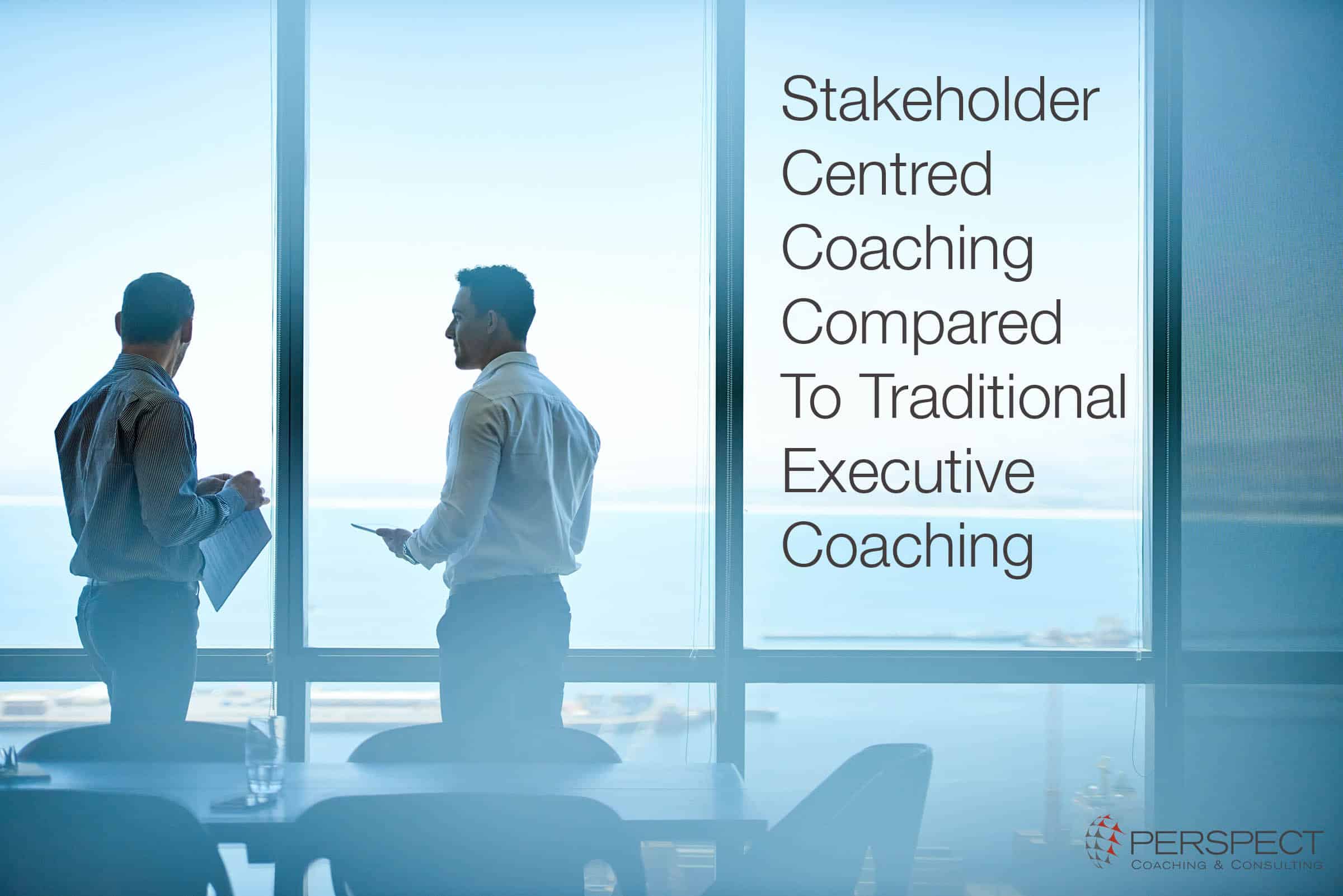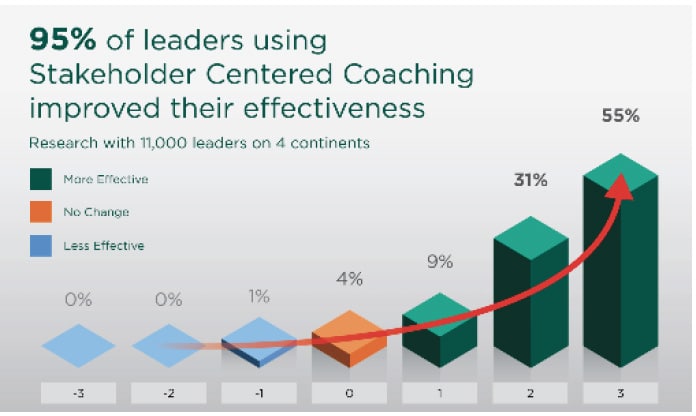2019

10 Questions To Ask Before Hiring An Executive Coach
Posted by Perspect
Stakeholder Centred Coaching Compared to Traditional Executive Coaching
Ever ask yourself, “What questions should I ask before hiring an executive coach?” If so, you are not alone.
Executive coaching has demonstrated significant ROI for organizations and leaders globally. With that said, not all coaches and methodologies are created equally or deliver the same value. Throughout my career, I have tried numerous approaches, all with a level of success. What I would like to do here is highlight an approach referred to as Stakeholder Centred Coaching (SCC) that we believe in so strongly we offer guaranteed outcomes or no pay business model.
In no way do I want to discount the benefits of traditional executive coaching when provided by a certified coach with the requisite experience. In fact, at the request of the client, we provide traditional 1:1 executive coaching. What I would like to do is draw comparisons and contrasts between SCC and traditional 1:1 to provide food for thought as you engage coaches in the future. Whether you are an executive, business owner or HR professional seeking to engage a leadership coach, we believe the questions below will allow you to think differently about the process and help you select the right approach for your organization.

1. How do you measure results? Is there a regular report you use?
| Stakeholder Centred Coaching (SCC) | Traditional Executive Coaching |
| SCC measures and reports on leadership improvement regularly throughout the process. | Traditional coaching does not typically or consistently measure or report on specific leader outcomes (sponsors cannot be sure if objectives were achieved). |
2. How do you bill? Is it based on specific outcomes or your time?
| Stakeholder Centred Coaching (SCC) | Traditional Executive Coaching |
| The Sponsor/Leader only pays if agreed upon development objectives are achieved by the client as perceived by stakeholders – model is Client-centric, not Coach-centric. | Traditional coaching is billed based on time spent with the client or on the exercises completed – not on outcomes achieved (resulting in sponsor potentially paying for “activity not results”.) |
3. What measurable results have your coaching practise achieved in the past?
| Stakeholder Centred Coaching (SCC) | Traditional Executive Coaching |
| SCC ROI has been studied in two broad studies and demonstrated to have a >95% success rate with more than 11,000 leaders around the world. We see typical ROIs > 2,000 percent. | No such research that we know of has been done on any single style of executive coaching. ICF has completed broad sweeping studies. |
4. How does your coaching methodology engage the broader organization?
| Stakeholder Centred Coaching (SCC) | Traditional Executive Coaching |
| Our clients engage a broad range of trusted stakeholders including bosses, coworkers, subordinates and even family at times, who are asked to help in daily coaching. The process inherently creates a much broader culture of change and trust that may not have existed. | Traditional coaching is focused on the 1:1 relationship with the client and coach who meet at a set frequency and generally does not reach out to involve others beyond the coach and the leader hence much lower impact – Lower ROI. |
5. Does my entire team need to know about our coaching arrangement? Or can we keep it secret?
| Stakeholder Centred Coaching (SCC) | Traditional Executive Coaching |
| SCC is a transparent process which engages key stakeholder in those things that the client is working to improve upon and the action plan that will achieve results. NB: All coaching conversations are bound by confidentiality. |
Traditional coaching is typically highly confidential, no one may even know of the coaching relationship. Fundamentally this impedes accountability. It’s hard to grow while you are hiding. Lower impact – lower ROI. |
6. How do you begin the coaching engagement? What’s expected from the client’s side?
| Stakeholder Centred Coaching (SCC) | Traditional Executive Coaching |
| SCC intake assessment involves the coach meeting with each of the client’s stakeholders to truly understand the individual via structured behavioural interviews by professional coaches that more clearly help identify the most impactful area for the leader to focus the developmental effort. | Traditional coaching typically uses web-based standard 360 assessments or personality tests only, to determine focus of coaching or simply gathering input from the client. This less through personalized approached reduces impact and ROI. |
7. Is there more focus on the past or the future of the client?
| Stakeholder Centred Coaching (SCC) | Traditional Executive Coaching |
| The emphasis of SCC is on ‘feedforward’, the future-oriented suggestion for leadership growth specify to the goal being targetted. | Traditional coaching tends to focus on feedback from 360s and coaching conversations. This varies with the coach’s approach. |
8. What leadership model do you use and what can we expect from working together?
| Stakeholder Centred Coaching (SCC) | Traditional Executive Coaching |
| SCC Coaches partner with clients to develop an aspirational leadership model that is authentic to the individual’s leadership style and personality – we identify one or two highly impactful behavioural shifts aligned to corporate strategy. We focus on who the client needs to be to achieve the Vision? | Often traditional coaching is focused more on the “moment” – “how can we best make use of this time today” without necessarily driving to a defined outcome and hence ROI. |
9. How does change occur in the engagement, and within the leader? How does your coaching style facilitate change?
| Stakeholder Centred Coaching (SCC) | Traditional Executive Coaching |
| SCC is a systematic change process where a change in leader behaviour and stakeholder perception occur in parallel, it is not only necessary for a leader to change, it is also necessary for those people around the leader to “see” the change and believe the leader will not regress. This is how we achieve sustainable outcomes. It is easier to change yourself than the perception of others, but not nearly as powerful. Leadership = influence. | Traditional coaching often leads to a positive change in the leader’s behaviour and the enhancement of the relationship between the leader and the coach. The concept of perception reinforcement is unique to SCC. |
10. What will I get when we’re done the engagement? Can I use what you teach to teach my team?
| Stakeholder Centred Coaching (SCC) | Traditional Executive Coaching |
| SCC is a highly transferable structured coaching process that the client learns how to deliver during the leadership growth journey – SCC clients ‘graduate’ as Stakeholder Centred Leaders and leadership coaches. SCC coaches have complete access to the process and tools to use within their team as they see fit – ‘paying it forward’ is the greatest compliment we receive. | Most traditional coaches do not leave any process for the client to share or repeat – it is based more on an inquiry process (there are some coaches using systems coaching however few share the process and tools with clients for future use in their organization). |
If you want the entire list of Stakeholder Centred coaching versus Traditional Executive Coaching, you can download it here:
If you are curious about what your leadership gaps are today, take our free leadership assessment to identify growth opportunities and receive quick tips to get started.
If you are interested in a few of the questions you may want to ask before hiring a Life Coach as compared to an Executive Coach check out this great article from our friends at JRNI.

